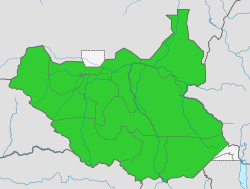Southern Sudanese independence referendum, 2011
| South Sudanese independence referendum, 2011 | ||||||||||||||||||||||
|---|---|---|---|---|---|---|---|---|---|---|---|---|---|---|---|---|---|---|---|---|---|---|
|
||||||||||||||||||||||
|
||||||||||||||||||||||
A referendum took place in Southern Sudan from 9 to 15 January 2011, on whether the region should remain a part of Sudan or become independent. The referendum was one of the consequences of the 2005 Naivasha Agreement between the Khartoum central government and the Sudan People's Liberation Army/Movement (SPLA/M).
A simultaneous referendum was supposed to be held in Abyei on whether to become part of Southern Sudan but it has been postponed due to conflict over demarcation and residency rights.
On 7 February 2011, the referendum commission published the final results, with 98.83% voting in favour of independence. While the ballots were suspended in 10 of the 79 counties for exceeding 100% of the voter turnout, the number of votes were still well over the requirement of 60% turnout, and the majority vote for secession is not in question.
The predetermined date for the creation of an independent state was 9 July 2011.
The prerequisites for the referendum included a census, which was used to define how wealth and political power will be apportioned between regions. The census was the basis of a voter registration process, which was also used for the national elections in 2010, which in turn set the stage for the referendum. The census was delayed three times. Problems included disagreements between the north and south over what they are obliged to do by the Naivasha Agreement, funding difficulties and an enormous logistical challenge. In the south, unmapped minefields from the war continue to make movement difficult, while up to five million Sudanese are nomadic. Up to two million internally displaced persons from the south remain in camps around Khartoum, in the center of the country, while refugees remain in Uganda and Kenya. A further complication results from the conflict in Darfur to the west, where civilians who have fled attacks refuse to take part in census out of fear that the government would use the results against them. Darfuri rebel groups are unanimous in their denunciation of the planned census, while the Justice and Equality Movement group has threatened to attack any census-taker.
...
Wikipedia

